The myth of the Decembrists - "knights without fear and reproach"
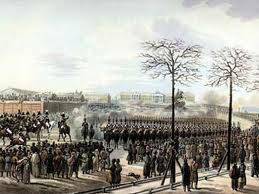 December 14 1825, an armed insurrection took place in the so-called. "Decembrists."
December 14 1825, an armed insurrection took place in the so-called. "Decembrists."Through the efforts of Western liberals, social democrats, and then historians of the Soviet Union, a myth was created about “knights without fear and reproach” who decided to destroy “tsarism” and build a society based on the principles of Freedom, Equality and Brotherhood.
But studying this period, not superficially, but carefully emerge details, which completely turn the idea of "Decembrists".
Help: Rise of the Decembrists - attempted coup d'état, held in St. Petersburg, capital of the Russian Empire, 14 (26) December 1825. The rebellion was carried out by a group of like-minded nobles (mostly officers), the conspirators set the main goal of liberalizing the Russian socio-political system and seizing power. The reason was the confusion in the inheritance of the throne. Several dozen officers were able to rebel up to 3 thousand soldiers. The emperor showed Will, the rebellion was suppressed. According to its results, 5 was hanged, the main conspirators, the rest were exiled to Siberia, some to the Caucasus. Soldiers were subject to corporal punishment.
There are many secrets in this rebellion: Why did the Russian nobles and officers deceive the soldiers into an armed rebellion? Why the main instigator of the December turmoil Prince Trubetskoy never came to the Senate Square? What did their programs lead to?
Causes and background
- One of the prerequisites is often referred to as the desire of officers to establish a more enlightened system in the Russian Empire. Like, visited Europe (foreign campaigns of the Russian army 1813-1814), imbued with the spirit of the French Revolution and decided to reset the royal tyranny.
Objective reasons for the rebellion was not, especially for the noble officers. The empire was on the rise of its power: the empire of Napoleon was crushed, the territory of the empire was increased due to the Duchy of Warsaw, the Russian army was the most powerful force on the planet - only that one of the most talented commanders in stories mankind, entering Paris as a winner. In the Empire, the rise of Russian culture - a surge of creativity in painting, architecture, literature, poetry, and science. The beginning of the "golden age" of Russian culture.
The interests of serfs defended? But peasants and workers lived in Europe is not sweet.
Program
In the school curriculum, and even in universities, they rarely talk about it, there is no careful study of the program documents “the Decembrists, but they are worth it.
One of the leaders of the conspirators Pavel Pestel created the so-called. "Russian Truth"
- On it in the country is established clear ethnic segregation (which the imperial, and before that, princely, tsarist governments did not do). The author divides the peoples inhabiting the empire into groups: the first is the indigenous Russian people, the second group is from nationalities, it is attached to Russia, the third group is from foreigners, living in the Russian Empire. Apparently, the colonial empire of Great Britain, so beloved by Westernizers of all stripes, was taken as a model.
- “Russkaya Pravda” provided for the abolition of serfdom, but a program was not developed to allot the peasants with land. What rrozil very large social upheavals.
- Pestel, believed that the monarchy should be destroyed along with the entire imperial house, including children. Set the regime of the republic, led by the dictator, guess who ...
"Constitution" Nikita Muravyev
“The peasants received land tithes of 2 from him, which is very small, in the conditions of the then low yields, the peasants would have to either die of hunger, or beg, or bow to the owners of the rest of the land — noblemen, that is, in bondage. Muravyov consciously, or by foolishness, also laid a social “bomb” of terrible power that would shake the empire to its foundations.
- The establishment of a constitutional monarchy, which in the conditions of Russia would lead to the Troubles. Voting rights lost women and all foreigners
- Both programs included - destruction of the standing army (!). And for this were Russian officers.
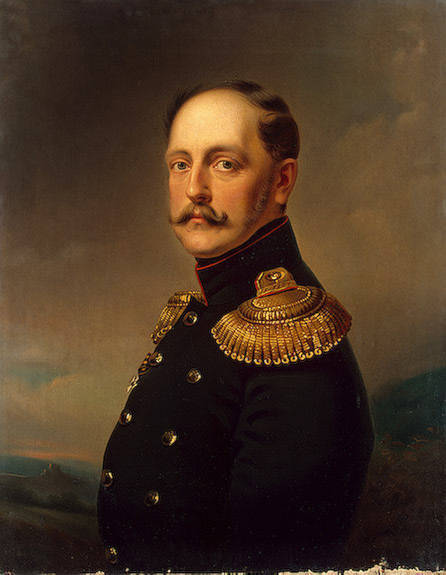
Who benefits?
Who benefits from the rebellion in the capital of the mighty Russian Empire, the liquidation of the imperial family, the dissolution of the army, the collapse and chaos?
It seems that Emperor Nicholas reached the answer, he writes to his brother: “The testimony given by Pestel is so important that I consider it a duty to notify you about them without delay. You will clearly see that business is becoming more serious because of its ramifications abroad and because everything that is happening here seems to be only a consequence or the effects of foreign influences ... "The main den of the beast at that time was London, it was the British schemers who staged the assassination of Emperor Paul I, when he guessed about the sinister role of the British in the conflict between Russia and France, concluded peace with Napoleon. And he began preparations for the Indian campaign - it was a blow to the very heart of the British colonial empire.
Three attempts to end the affair ended in blood
Emperor Alexander had no male children, so he bequeathed the throne to his brother, Nicholas. Officially, the throne was to be occupied by Constantine, the second son of Paul, but he refused the throne, few knew about it. Alexander I suddenly died, according to one of the versions, tired of the burden of power, became a wandering recluse. Since Konstantin Pavlovich did not publicly abdicate the throne, it turned out that he was formally a legitimate emperor. Nikolai tried to prove his innocence, but the governor-general of St. Petersburg, Miloradovich, categorically refused to bring the troops to the oath. While Konstantin will not deny publicly, but he still pulled the bagpipes.
Finally, Konstantin Pavlovich confirmed the renunciation officially. 14 December 1825 of the year was to take the oath of the new emperor. The conspirators decide to take advantage of this confusion. They lie to the soldiers and sailors, saying that the lawful tsar was arrested, and the throne was seized by an impostor Nikolai.
Nikolay's attempts to solve the matter in peace were stopped by the blood of truce. Having built in the square, the rebels lined up on the Senate Square of the capital. You can still decide. There is an opportunity to finish everything with the world, to explain to the soldiers that they were basely deceived by the best feelings, they do not defend the honor of the Empire, but made them hostages in the Dirty Game. Therefore, the "Decembrists" really need to shed blood in order to deprive the emperor of the possibility of solving the problem, calling for common sense soldiers.
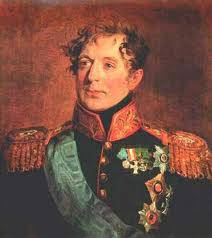 The hero of the Patriotic War 1812 of the year and the foreign campaign 1813-1814, the governor-general of the capital, Mikhail Andreevich Miloradovich, was sent to the rebels. Soldiers love him, he won universal respect with his courage, fearlessness, it was the general of the Suvorov school - he participated together with the great commander and the Italian, Swiss campaigns. He participated in more 50 battles and was not injured, although he did not bow to the bullets - the French nicknamed him “Russian Bayard”. On this tragic day he is wounded twice, one wound will be fatal: Obolensky will hit him with a bayonet, and Kakhovsky will shoot him in the back, mortally wounding the hero of the empire. When, the doctors will take out a bullet for him, which pierced his lungs, he will ask her to look and see that she is a pistol, he will be very happy to cry out: “Oh thank God! This bullet is not a soldier! Now I am completely happy! ”
The hero of the Patriotic War 1812 of the year and the foreign campaign 1813-1814, the governor-general of the capital, Mikhail Andreevich Miloradovich, was sent to the rebels. Soldiers love him, he won universal respect with his courage, fearlessness, it was the general of the Suvorov school - he participated together with the great commander and the Italian, Swiss campaigns. He participated in more 50 battles and was not injured, although he did not bow to the bullets - the French nicknamed him “Russian Bayard”. On this tragic day he is wounded twice, one wound will be fatal: Obolensky will hit him with a bayonet, and Kakhovsky will shoot him in the back, mortally wounding the hero of the empire. When, the doctors will take out a bullet for him, which pierced his lungs, he will ask her to look and see that she is a pistol, he will be very happy to cry out: “Oh thank God! This bullet is not a soldier! Now I am completely happy! ” But even after this dirty murder, Nikolai tries to do without blood again. Tsar's next inmate, Colonel Stürler (a French aristocrat who served the empire and fought bravely against Napoleon, was distinguished by great honesty and zeal in the service), was shot dead by the already “famous” Kakhovsky.
The third herald of the world - Grand Duke Mikhail Pavlovich, brother of the emperor, was also nearly killed by the "p-revolutionaries." Parliamentarians rescued sailors who took weapon, indignant at the attempt to kill an unarmed truce (among the rebels were the sailors of the Guards crew).
Over another envoy - Major General Sukhozanet, they only laughed, since he had low authority among the military. One of the conspirators - Belyaev, later in the memoirs, wrote that "it was decided to shoot only those who could shake the rebels with their glorious name." What Jesuit logic is to kill the best.
After that, the emperor had no choice. The words: "Your Majesty, order us to clear the square with grape-shot or abdicate the throne" - Adjutant-General Count Tol. The emperor ordered to roll out the guns and open fire. The first volley was given over the people, the rebels still have a chance to obey. But they are preparing for a bayonet attack, the second volley disperses the rebels. The revolt is depressed, many people from the townspeople will pay for their curiosity, they came to gawk at an unprecedented spectacle and fall under the carter's volley, crush someone, cripple in a crush when the crowd runs away.
Сonclusion
The conspirators are arrested. Once in Petropavlovsk fortress, the arrested men scribbled letters of denunciation to Nicholas, where they justified themselves and asked for forgiveness, while at the same time dragging everything on their “comrades”. “To exterminate you, Sire, in honor never came into my head,” writes the prince from the conclusion of Bestuzhev. P.I. Pestel, the author of Russkaya Pravda, warned everyone before the uprising that if he was arrested, he would tell everything and betray everyone.
The emperor of the Russian Empire, Nicholas I, who was recorded in history as “Palkin,” displayed the highest heights of humanity and Christian charity. Of the 579 people arrested in the Decembrist case, almost 300 was acquitted. Only the leaders (and not all) were executed and the killer - Pestel, Muravyev-Apostol, Ryleev, Bestuzhev-Ryumin, Kakhovsky, 88 people were sent to penal servitude, 18 to the settlement, 15 was degraded to the soldiers. Corporal punishment was applied to the insurgent soldiers.
The “leader” of the rebels, Prince Trubetskoy, did not appear at all on Senate Square, sitting at the Austrian ambassador, where he was tied up. At first he denied everything, then he confessed and asked for forgiveness from the sovereign. And Nicholas I forgave him, the “tyrants” humane in our country, however, ruled.
In any other country this would not have happened - “they would have opened up the whole underground”, hundreds would have been executed. The emperor did not insult the feelings of the noble aristocracy, who did not follow his "children".
London's plan to destabilize the Russian Empire was failed. Although England was preparing not only a rebellion in the capital, almost simultaneously a blow was struck from the South - in the 1826, the next Russian-Persian war begins, it will end for Russia with a victory in 1828. And the Russian-Turkish war of 1828 - 1829 will immediately begin, in which the Russian army will also crush the aggressor. Any honest historian will say that the main organizer of all the wars of that period of Russia with its southern neighbors were the British. Instructions, instructors, money, weapons went from the Ottoman Empire and Persia from the British.
The essence is simple, do not let the Russian Empire to the southern seas - through the Bosphorus and Dardanelles to the Mediterranean Sea; go through Iran to the Persian Gulf, do not let us into Afghanistan, India. For this, London used all available means - pushed neighbors to war with us, inspired conspiracies within the empire. In extreme cases, he went into open conflict, as in the Crimean War.
- Alexander Samsonov
- http://topwar.ru"rel =" nofollow ">http://topwar.ru
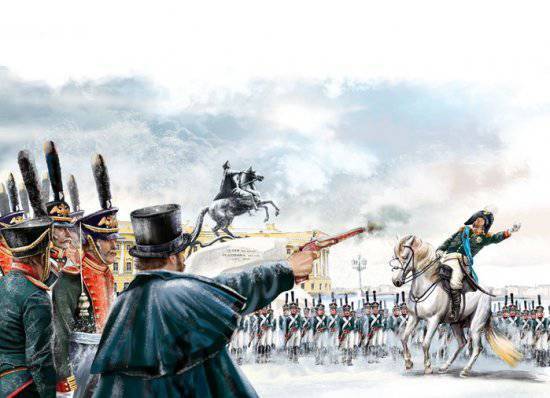
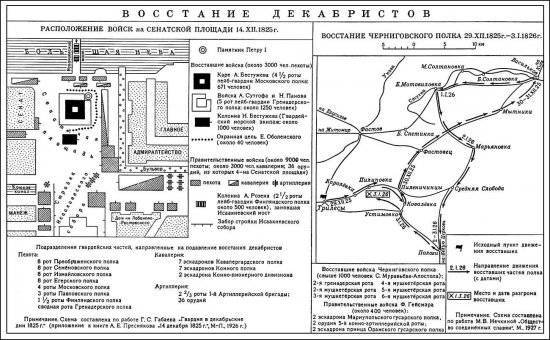
Information